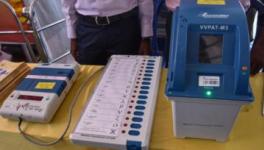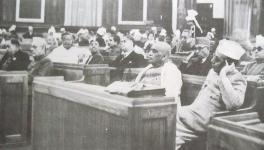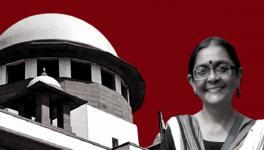Enron Case: Epitome of Systemic Failure of Judicial Scrutiny in India
Image for representational use only.Image Courtesy : Livemint
The Supreme Court on April 6, 2019, closed the long pending ‘Enron’ case, (Special Leave Petition(C) No. 7734 of 1997), once again declining to order judicial scrutiny into the matter on the ground that by this point in time, it was too late to do so. The verbatim text of the order narrates some of the circumstances for the delay, and is worth repeating here in detail:
‘Though the High Court came to the conclusion that the action of the Board and the Governments concerned was questionable and that everything was not above board, it dismissed the writ petition(s) on the ground that the petitioner had not been able to place on record before the Court any material justifying the allegations as regards corruption, bribery, fraud and misrepresentation.’
‘Thereafter, the petitioner filed the present petition. On 02.05.1997, this Court issued notice only on the following issue:
“ The accountability of the State of Maharashtra (respondent No. 2) in this matter,
particularly, on account of the inconsistent stand taken by it from time to time.”
‘By the same order, this Court refused leave in so far as the question of the validity of the project and contract for Dabhol Power Project was.’
‘While the special leave petition was pending, the State of Maharashtra appointed a Committee headed by Dr. Madhav Godbole, former Home Secretary (known as ‘Godbole Committee’) to go into the matter.’
‘The Godbole Committee submitted its report to the State of Maharashtra on 1Oth April, 2001 indicating serious illegalities/infirmities in the matter of award of the contract and processing of approvals, which were prima facie against public interest. Failure of governance, it was observed, was broad and across different governments and at both administrative and political levels. However, there was difference of opinion amongst members of the Godbole Committee, whether it should recommend appointment of a judicial commission of inquiry under the Commission of Inquiry Act, 1952. Whereas 2 members felt that that a Judicial Commission of Inquiry should be constituted, 3 members did not agree with the said proposal.’
‘On 7th November, 2001, Shri Justice S. P. Kurdukar, a former Judge, was appointed for thorough investigation into the aspects of culpability of various public servants.’
‘The Union of India filed a suit before this Court (Original Suit No.2 of 2003 – Union of India vs. State of Maharashtra & Anr.) and an order was passed in the said suit staying further proceedings of the Kurdukar commission of inquiry. This suit came to be finally dismissed in the year 2014. Thereafter, the matter came up before this Court on 18.02.2015 when learned counsel appearing for the State of Maharashtra prayed for some time to find out whether Justice Kurdukar would be in a position
to resume the proceedings. No response has been filed. The fact remains that the Commission has not functioned even after dismissal of the suit.’
‘It appears that nothing much was done and the matter came up before this Court on 07.03.2018 when this Court directed the State of Maharashtra to inform the Court whether it would like the Kurdukar Commission of inquiry to continue or would they like the case to be argued on merits. The State of Maharashtra subsequently filed an affidavit that due to long efflux of time it was no longer useful or feasible to continue with the judicial commission of inquiry.’
‘Therefore, the hearing in this case is limited to the question
as to whether the judicial commission of inquiry should continue
or not.’
‘Dr. Rajeev Dhawan, learned senior counsel appearing as amicus curiae, urged that in view of the serious allegations of corruption and abdication of duties by various authorities and officials, it would be in the interest of justice to continue with the commission of inquiry and in case Justice Kurdukar was not able to continue with the commission of inquiry, the same could be headed by some other retired Judge of the Supreme Court of India.’
‘Dr. Dhawan drew our attention to the various portions of
the report submitted by Dr. Godbole committee. We may make
reference only to following portion:
“The Committee is troubled with the failure of governance that seems to have characterized almost every step of the decision making process on matters relating to DPC. This failure of governance has been broad, across different governments at different points of time, at both the State and the Central level, and across different agencies associated with examining the project, and at both the administrative and
political levels. It strains belief to accept that such widespread and consistent failure to execute assigned responsibilities is purely coincidental. Though the Committee was given certain additional terms of reference, specifically, item (3) of Resolution No. PSP 2001/CR3448/NRG2 dated March 9, 2001, it has unanimously decided that it is not the proper forum to investigate such matters to the degree that would be required. The Committee, in the short time allocated to it, is unable to determine reasons for the consistent lapses, but is extremely concerned at it.”
‘The Committee has found serious infirmities in the manner in which the PPA was executed, the manner in which it was renegotiated, the manner in which the tariff was fixed etc.. As per the Committee, everything was done in a manner which helped DPC and caused loss to the MSEB and the public at large.
‘It would be pertinent to mention that the foreign company Enron, which was involved, has abandoned the project. The project is virtually working at half the capacity and the rate of production of electricity is so high that the project has become economically unviable. In these circumstances, Dr. Dhawan urged that this Court should continue with the commission of inquiry.
‘We are of the considered view that though normally in such
a case a judicial inquiry should have been conducted but as far
as the present case is concerned, more than a quarter of century
has elapsed since the first PPA was executed. The foreign corporation and the original project proponents are no longer available. Most of the
senior officials would have retired and virtually no action can be taken against them. Furthermore, the commission of inquiry even if continued or constituted afresh, will take its own time and, as opined by 3 Members of the Godbole Committee, the constitution of such commission of
inquiry would serve no useful purpose. This was the stand in the year 2001 and has greater force 18 years later.
“In view of the long delay and in view of the fact that due to
non availability of many persons involved, no useful purpose
would be served in continuing with the judicial commission of
inquiry, we close the petition in the peculiar facts and
circumstances of the case.”
To the repeated ‘failures of governance at every step of the decision making process on matters relating to DPC’ highlighted by the Godbole Committee must now be added a new category -- a systemic failure of judicial scrutiny.
The initial phases of this systemic failure of judicial scrutiny in the context of the Enron project has been lucidly detailed for posterity in the outstanding monograph ‘Power Play’ by late Abhay Mehta, who was co-petitioner with Centre of Indian Trade Union (CITU) in the writ petition challenging the project. The CITU petition challenged the project on two grounds – first, that the techno-economic clearance given to the project was defective, that the PPA (power purchase agreement) tariff was excessive, with multiple violations of existing legal norms, and second, that the Maharashtra government could not enter into a contract with a party that it itself had accused of corruption a few months previously.
During the hearings of the CITU-Mehta petition, (which was heard along with two substantive petitions filed by late S.R. Paranjpe, a senior nuclear power engineer, retired from Bhabha Atomic Research Centre, and the late P.N. Samant and Pradumnya Kaul,) it was brought to the attention of the court, through documents on record as well as oral arguments by petitioner’s counsels Shanti Bhushan and Sunip Sen, that the excessive Enron tariff contracted was itself evidence of unprecedented corruption. Excess tariff of just Re 1 per unit would result in about Rs 1,700 crore unjustified earnings for Enron each year, in a contract for 20 years.
The CITU petition was dismissed on the technical ground of ‘res judicata’, without an examination on merits. Before dismissing the petition, Justice B.P. Saraf of the division bench directed the Chief Minister of Maharashtra to file an affidavit stating the reasons for scrapping the project and then re-negotiating it.
As narrated by Abhay Mehta: “On 3 September 1996, the chief minister of Maharashtra filed an affidavit that was deliberately false. He affirmed on oath, that all the allegations of fraud, misrepresentation and corruption made in the suit, were made “on the basis of newspaper report”…….The court instructed the Advocate General to incorporate a new line as part of the affidavit while commenting on the corruption issue. The Bench instructed the court clerk to add the words that the allegations of bribery and corruption made against Enron in various newspapers were ‘without basis’…… ‘The High Court prohibited the petitioners from replying to the CM’s perjurious affidavit. The court took the affidavit on file and declined the petitioners request to file a written reply to it or even to put up oral arguments. Justice Saraf observed, “There is a limit to which we can go on taking papers on record. You may give more written submissions to the court but we will not look at them…. We will get them sealed and simply keep it in the records. If we go on arguing, this can go on forever.”
The petitioners then filed the Special Leave Petition in the Supreme Court. As Mehta wrote: “On 2 May 1997, the Supreme Court of India , in what appears to be one of the strangest decisions of recent times, did not allow any arguments on the issues raised by the above judgement, the documentary evidence and on the critical question of the clearance by the CEA. The Supreme Court deleted all but one of the answering parties, including the Government of India, the CEA and Enron i.e. neither the CEA, nor the MSEB and Enron are answerable in this case…”
The laws of economics being independent of legal principles, like res judicata, tariff concerns raised in the Paranjape-Samant-Kaul-CITU-Mehta petitions soon began to unfold with a vengeance. The tariff charged by DPC/Enron, when the project commenced supply of electricity turned out to be even higher than the calculations. It did not take long for the project to get stalled in a financial breakdown, leading to acrimonious litigation between Maharashtra State Electricity Board and Enron in early 2001.
The appointment of the Godbole Committee and subsequently the Justice Kurdukar Commission provided another opportunity to examine evidence of fraud and corruption. Documents were again placed on record before the Commission. However, this fresh opportunity for judicial scrutiny was again shut by the orders of the Supreme Court staying the proceedings by the Kurdukar Commission in the suit filed by the Atal Bihari Vajpayee government. The stay continued till 2014.
In contrast, Enron Corporation in the US was subjected to judicial scrutiny including criminal investigation by the US Department of Justice subsequent to its financial collapse in 2001. Enron executives at the highest level were indicted, tried and convicted. Its Chief Executive Officer, Jeffrey Skilling, was sentenced to 24 years in prison. Its Chairman, Kenneth Lay, was also convicted, but suffered untimely death a few weeks prior to the sentencing. Its Chief Financial Officer, Andrew Fastow, received a six-year sentence. Vice President J Clifford Baxter was found dead with gunshot wounds, described as a suicide. In 2001, Enron became the biggest corporate bankruptcy in US history. Investors, including several pension funds, lost tens of billions of dollars in the debacle.
Indian banks lost not less than Rs 9,000 crore in the Dabhol fiasco. Additionally, the government of India was compelled to settle with GE and Bechtel their claim for $1.2 billion arising out of the sovereign guarantee hurriedly and secretively signed by the 13-day Vajpayee government in 1996 on its last day before it resigned. In contrast with the US judicial system, however, not a single person has been tried in India for criminal misdemeanour. In fact, not a single official has so much as lost a promotion during the entire 25 years of the Enron debacle. In India, no one, at any point in time, has been brought to justice in this monumental scam.
Enron was not an exception. Enron may be dead, but ‘enronomics’ continues. Enron Corporation was more than a gas and electricity energy supplier. It was also the pioneering leader in the new market economy for broad band data, network connectivity, and power, an aggressive trader of tangible and intangible assets in the digital market . ‘Enronomics’ was also about innovative valuation and creative accounting. Setting up special purpose vehicles and transferring debt to these subsidiaries to dress up the balance sheet was part of this. Along with Enron, its auditor, Arthur Andersen, then the world’s largest audit company, also collapsed terminally in 2001.
Energy and digital commerce are key sectors in global neo-liberal economics. In India, too, they are at the core of the neoliberal restructuring of the economy. Privatisation of public utilities, fuel pricing, and tariff fixation continues to be the source spring of mega-corruption. The corruption of previous governments pales in comparison to what is set up in the energy sector under the Narendra Modi government. Cash and infrastructure-rich public sector companies like ONGC, GAIL, NTPC and BSNL have been systematically weakened and set up for private corporate takeover. Half the nation’s natural resources, like coal, have been transferred to private corporations. All the energy-related ministries have been centralised in the hands of a single minister. Profitable areas of fuel linkage and supply, electricity generation and distribution are systematically transferred to corporate houses, such as Ambani and Adani.
With centralisation of power in the hands of corporates, tariffs are now being systematically increased. With Enron, a Re 1 excess tariff translated to corrupt earnings of Rs 1,700 crores per annum. In today’s circumstances, a Re 1 increase in electricity tariff translates to extra earnings of Rs 1.5 lakh crore per year, every year, in perpetuity, for the private corporate sector. The Enron case may be closed, but clearly, this is not the end of the matter.
The writer was Secretary General of the Centre of Indian Trade Unions in Maharashtra, which was a co-petitioner in challenging the Enron project in court.
Get the latest reports & analysis with people's perspective on Protests, movements & deep analytical videos, discussions of the current affairs in your Telegram app. Subscribe to NewsClick's Telegram channel & get Real-Time updates on stories, as they get published on our website.























